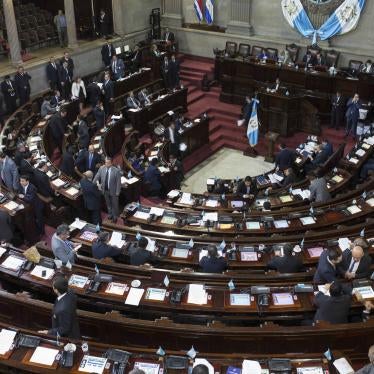On International Women’s Day, March 8, the Guatemalan Congress passed an extraordinarily regressive “Life and Family” bill that undermines the rights of women and lesbian, gay, bisexual, and transgender (LGBT) people. President Alejandro Giammattei announced on March 10 that he would veto the law, noting that it violated international treaties. While outrage around the bill is justified and should continue, the bill also serves to divert attention from the pernicious dismantling of the rule of law that the government and its allies are currently undertaking.
The far-reaching bill expands the criminalization of abortion and could subject women who have miscarriages to questioning by law enforcement authorities, or even prosecution. The new proposal defines abortion as the “natural or provoked death” of an embryo or fetus. It establishes prison sentences of up to four years for women who “cause their own abortion,” and 10 years for women who seek an abortion. Under current law, abortion is legal in Guatemala only when the life of a pregnant woman or girl is in danger.
The proposal establishes that “freedom of conscience and expression” protects people from being “forced to share or participate in non-heterosexual conduct and practices.” The vagueness of this article appears aimed at legally protecting discrimination on the basis of sexual orientation, such as in housing, employment or service provision. The bill defines “family” as “father, mother, and children,” deliberately excluding the realities of diverse families; and explicitly bans same-sex marriage and unions.
The “Life and Family” bill represents an affront to comprehensive sexuality education as it bans schools from teaching about LGBT people and sexual and reproductive health rights, curtailing children’s and adolescents’ rights to education, information, and health.
The passage of the bill, which had been stalled in Congress since 2018, is not just noteworthy for its flagrant violations of human rights, but also for its timing.
In recent days, Attorney General Consuelo Porras issued a new round of arrest warrants for anti-corruption prosecutors from her own office who had been investigating the president and other high-level officials. Some prosecutors have resigned or fled the country. New corruption allegations against President Alejandro Giammattei also surfaced last month.
These are just the latest in years of attacks on the rule of law that have left Guatemala’s democratic institutions hanging by a thread. Since Giammattei took office in 2020, he has worked with Congress and Porras to block any remaining corruption investigations that implicated senior politicians, by attempting to remove the last few independent judges and packing the Constitutional Court.
Moving the “Life and Family” bill forward now has left human rights activists scrambling to fight against backsliding on multiple important fronts. And this may very well be part of a pernicious strategy by conservative and corrupt officials at a time when corruption seems to be winning, even as the international community expresses concern and dissatisfaction.
Indeed, the bill and other government initiatives appear to be designed to move the public debate in Guatemala away from the issues of corruption and judicial independence as they polarize the population on issues like abortion and LGBT rights. On March 9, a day after the Guatemalan Congress passed the bill, Giammattei took part in a Christian congress that declared Guatemala the “pro-life capital of Ibero-America.”
And the “Life and Family” bill may not be the last one to be employed as a distraction tactic. Bill 5940, recently passed unanimously by a congressional commission, stigmatizes transgender people and limits information about their existence in schools. It also regulates information about trans people in media outlets.
President Giammattei is right in saying that the “Life and Family” bill violates international law. His veto is a significant about-turn for a man who has a track record of supporting initiatives that threaten the rights of women and LGBT people. A risk remains that a two-thirds majority of Congress could overturn his decision. But whatever the ultimate outcome, the bill has already done harm by drawing attention away from endemic corruption and the erosion of the rule of law in Guatemala.









